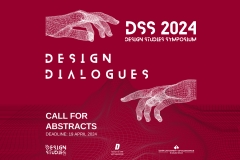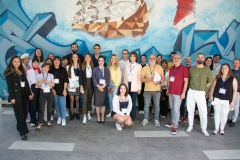
GRADUATE SCHOOL
Ph.D. In Design Studies
FFD 662 | Course Introduction and Application Information
| Course Name |
Innovative Design Research
|
|
Code
|
Semester
|
Theory
(hour/week) |
Application/Lab
(hour/week) |
Local Credits
|
ECTS
|
|
FFD 662
|
Fall
|
3
|
0
|
3
|
7.5
|
| Prerequisites |
None
|
|||||
| Course Language |
English
|
|||||
| Course Type |
Required
|
|||||
| Course Level |
Third Cycle
|
|||||
| Mode of Delivery | - | |||||
| Teaching Methods and Techniques of the Course | DiscussionGroup WorkCritical feedbackLecture / Presentation | |||||
| Course Coordinator | ||||||
| Course Lecturer(s) | ||||||
| Assistant(s) | - | |||||
| Course Objectives | The aim of the course is the conceptual development of innovative design research methodologies for specific research projects or fields of research and thus enrich the possibilities for design research and fields of research. |
| Learning Outcomes |
The students who succeeded in this course;
|
| Course Description | This course involves the analysis of design and design research literature and research methods from other disciplines. Furthermore, students are expected to determine new research areas or apply some of the methods to a selected project in order to generate new data or knowledge as time and resources permit. |
|
|
Core Courses | |
| Major Area Courses |
X
|
|
| Supportive Courses | ||
| Media and Management Skills Courses | ||
| Transferable Skill Courses |
WEEKLY SUBJECTS AND RELATED PREPARATION STUDIES
| Week | Subjects | Related Preparation |
| 1 | Introduction to the course | None |
| 2 | Fundamentals of research, ontology, epistemology, definitions - Student presentations | Student presentations |
| 3 | Design research - Project selection | Reading - Cross |
| 4 | Understanding methodologies | Reading – O'Leary |
| 5 | Qualitative approaches - observation, interviews | Reading – Wellington & Szczerbinski |
| 6 | Qualitative approaches – focus groups, case studies | Reading – W & S |
| 7 | Qualitative approaches – dealing with qualitative data | Reading – W & S |
| 8 | Quantitative approaches - surveys, experiments/ Project review and presentations 1 | Reading – O’Leary; Report 1; Student presentations |
| 9 | Midterm | All material covered |
| 10 | Quantitative approaches - dealing with quantitative data, statistics | Reading – W & S |
| 11 | Presenting and disseminating research | Reading – W & S |
| 12 | Ethics in research | Reading – O’Leary |
| 13 | Presenting and disseminating research | Reading - W & S |
| 14 | Student research presentations | Student presentations and final report |
| 15 | Review of the semester | |
| 16 | Final evaluations |
| Course Notes/Textbooks | Jerry Wellington , and Marcin Szczerbinski (2007) Research Methods for the Social Sciences Bloomsbury Publishing Laurel B (ed) (2003) Design research. MIT Press, Cambridge MA ISBN: 9780262122634 McIntyre L (2005) Need to know, social science research methods. McGraw Hill, New York NY, ISBN10: 0767413172 Creswell JW (2014) Research design. Sage Publications, Thousand Oaks CA, ISBN: 9781452226101 O’Leary G (2017) The Essential Guide to Doing Your Research Project. Sage Publications, London, ISBN: 9781473952089 |
| Suggested Readings/Materials | Cross, N. (1999). Design research: A disciplined conversation. Design issues, 15(2), 5-10 Margolin, V. (1992). Design history or design studies: subject matter and methods. Design Studies, 13(2), 104-116. Salvador et al. (1999) Design Ethnography. Design Management Journal 10, 35-41. |
EVALUATION SYSTEM
| Semester Activities | Number | Weigthing |
| Participation |
-
|
|
| Laboratory / Application | ||
| Field Work | ||
| Quizzes / Studio Critiques | ||
| Portfolio | ||
| Homework / Assignments | ||
| Presentation / Jury |
2
|
20
|
| Project |
1
|
50
|
| Seminar / Workshop | ||
| Oral Exams | ||
| Midterm |
1
|
30
|
| Final Exam | ||
| Total |
| Weighting of Semester Activities on the Final Grade |
100
|
|
| Weighting of End-of-Semester Activities on the Final Grade | ||
| Total |
ECTS / WORKLOAD TABLE
| Semester Activities | Number | Duration (Hours) | Workload |
|---|---|---|---|
| Theoretical Course Hours (Including exam week: 16 x total hours) |
16
|
3
|
48
|
| Laboratory / Application Hours (Including exam week: '.16.' x total hours) |
16
|
0
|
|
| Study Hours Out of Class |
10
|
2
|
20
|
| Field Work |
0
|
||
| Quizzes / Studio Critiques |
0
|
||
| Portfolio |
0
|
||
| Homework / Assignments |
0
|
||
| Presentation / Jury |
2
|
6
|
12
|
| Project |
1
|
100
|
100
|
| Seminar / Workshop |
0
|
||
| Oral Exam |
0
|
||
| Midterms |
1
|
14
|
14
|
| Final Exam |
0
|
||
| Total |
194
|
COURSE LEARNING OUTCOMES AND PROGRAM QUALIFICATIONS RELATIONSHIP
|
#
|
Program Competencies/Outcomes |
* Contribution Level
|
||||
|
1
|
2
|
3
|
4
|
5
|
||
| 1 | to be able to develop scientific expertise and capabilities in the field of design studies by using creative and critical thinking as well as research skills; innovatively contributing to the discipline through new ideas, |
X | ||||
| 2 | to be able to comprehend the interaction across various disciplines related to the field of design reaching at original conclusions via using new and complex analysis, synthesis and evaluation skills, |
X | ||||
| 3 | to be able to develop new strategic approaches to solve unforeseen complex issues in design practice through integrative and creative elaboration, |
X | ||||
| 4 | to be able to conduct independent research, analyze scientific phenomena through a broad, deep and critical perspective, arrive at new syntheses and evaluations in design discipline, |
X | ||||
| 5 | to be able to publish scientific articles in reputable refereed journals, present papers in scientific conferences in the field of design and its sub-disciplines, |
X | ||||
| 6 | to be able to develop effective communication skills to scientifically present and defend original ideas to an expert audience, |
X | ||||
| 7 | to be able to conduct affective team work in the field of design, |
|||||
| 8 | to be able to use the English language fluently for both comprehending scientific publications and developing proper communication with foreign colleagues, |
X | ||||
| 9 | to be able to contribute to the process of transforming into an " information society", by following the technological, social and cultural developments on both academic and professional grounds continuously, |
X | ||||
| 10 | to be able to develop skills of designing and producing unique models and products that will be certificated as registered design, trade mark and patents. |
X | ||||
*1 Lowest, 2 Low, 3 Average, 4 High, 5 Highest
NEWS |ALL NEWS

DSS 2024 CALL FOR PAPERS | THEME: DESIGN DIALOGUES
DSS 2024 CALL FOR PAPERS THEME: DESIGN DIALOGUES The Design Studies Graduate Program and the Faculty of Fine Arts and Design at the Izmir

Design Studies Symposium 2023: Realities & Frontiers
The Design Studies Symposium 2023 (DSS 2023) organized by the IEU Graduate School Design Studies programs was held on 1-2 June, at




